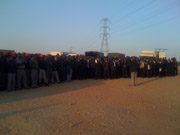Organising in private security in Namibia

The Private Security Industry in Namibia is beset with problems despite being one of the few industries that have a National Minimum Wage set by the Government. The current rate is N$3.80 per hour (US$ 0.50), last set in March 2009. The lowest paid guards receive a monthly pay of around N$1000 (less than US$150) and 90% earn less than N$2000. Despite this, wages in this sector are some of the lowest in the Namibian economy and adherence to the minimum wage varies amongst employers.
Almost 80% of security guards work between 11 and 12 hours per day (60 hours per week) mostly, without any breaks. Many exceed these hours and work 7-days-a-week, often for no extra pay. Agreed overtime rates are rarely paid. There are problems with shift bonuses and uniform deductions. Only 20% of workers have a copy of their contract of employment, and feedback is often that they sign a contract written in English, but are fired in Afrikaans or German. Nearly all (99%) of workers have no medical cover, 30% have never had any training and 46% have never had a pay rise. Most workers have no access to electricity, water, heat in the winter or shade in the summer. Deaths sometimes occur as a result of poor safety requirements when workers are transported between work postings. There is no sick pay provision, so no work equals no pay. Absences are deducted at double rate from wages in the form of a replacement fee.
After 20 years of independence, the country is still highly fragmented and suffering extreme levels of poverty and inequality. As a middle-income country with one of the most unequal income distributions in the world, Namibia is a place of poverty amid plenty. This is evidenced from a number of different reports and studies. For example, the GINI coefficient, which is a measure of the inequality of income distribution, classifies Namibia as the country with the biggest income gap in the world and the highest discrepancies in the distribution of wealth.The United Nations Development Programme continues to prioritise work in Namibia to address poverty and inequality. The UN Human Development Index widely accepted as an accurate measure of living standards also ranks Namibia poorly; as 126 out of 177 countries. It is important to note here that Namibia also has high HIV infection rates and the world’s second highest tuberculosis (TB) rate.
UNI Property Services is working with the Namibian Transport and Allied Workers Union (NATAU) to build union membership and activity so that workers can start to address these problems. This will mean empowering and supporting security workers to win better conditions and treatment at work and pressurise the government to regulate the industry more effectively. For the next two months, we have commissioned researchers to talk to guards to find out more about their issues, employers and clients. This information will be used in October to develop a more detailed work programme for the next few years. There is much to be done and you can follow our progress here over the next period.

